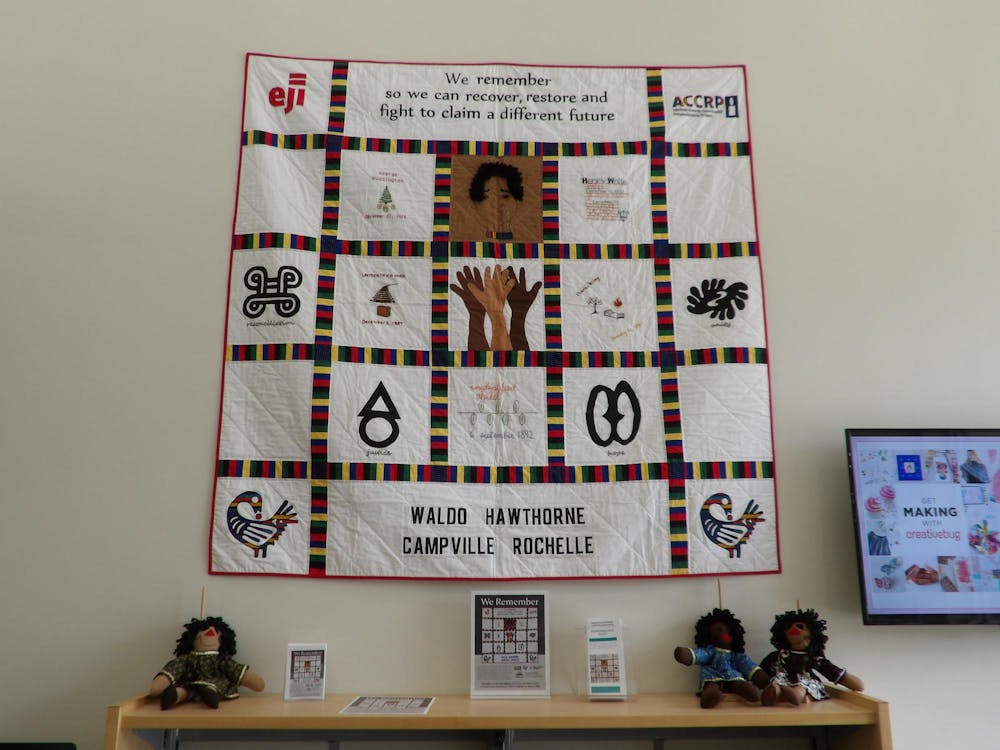On Friday, a remembrance quilt was temporarily displayed at the Alachua County Library District Waldo Branch honoring the lives of five lynching victims from the Waldo, Hawthorne, Rochelle and Campville areas.
Pastor Mary Jackson, Waldo quilt sub-committee chair, said the project is about making a difference in the community.
“This project is important because we get an opportunity to remember and honor these lynching victims,” she said. “If we didn't do this, no one will remember who they are.”
Between 1882 and 1930, Florida had the highest per capita lynching rate in the United States, with Alachua County as the frontrunner, according to Commissioner Charles Chestnut IV. The Remembrance Project began as a way to offer truth and reconciliation on the county’s history of racial violence.
Commissioner Chestnut said the exhibit is not intended to shame or blame any race for the conflict but rather to acknowledge and remember history.
“When I was in high school, when we got to Black history, the only history we talked about was slavery, but it was so short,” he said. “It didn't go into details about what we know now as today in terms of what actually happened … so, let's talk about the history and move forward.”
Research for the project came primarily from archived newspapers in other cities and states, Chestnut said.
“None of that stuff was printed in our local papers,” he said. “No, that was printed in other papers in other states, other cities, but it wasn't in Alachua County or Gainesville at all …That’s unusual in the local press to talk about the kind of stuff that they did.
Chestnut said the exhibit aims to encourage community healing.
The quilts are a part of the larger June 1 Alachua County Remembrance Project collection of soil from county lynching sites, which remains on permanent display in the Alachua County Board of Commissioners Office.
Dawn Beachy, Alachua County remembrance quilts team leader, said the project is a product of 6 to 8 people quilting by hand and 12 to 15 others offering design and financial support. While two more quilts are currently in the works, she said there are five total completed and an additional one planned.
“My goal in making these quilts is education, storytelling and remembrance,” she said. “They are used to let people know about what has happened in the past and as the quote alludes to, change the future.”
The quilt reads, “We remember so we can recover, restore, and fight to claim a different future,” in honor of six victims: Charles Wiley, Ellis Washington, Henry White, George Buddington, an unknown Black man and an unknown Black child.
Alachua County Library Director Shaney Livingston said the project is a valuable addition to the library.
“I think it's important that those who were not aware, this is an awareness to them and things that have taken place in the county,” Livingston said.
Pamphlets with information identifying each lynching victim, carried the message, “No one was held accountable for any of these racial terror lynchings.”
Waldo City Manager Kim Worley said the city has been “super supportive” of the project.
“History in itself is important anywhere, whether it's Waldo or wherever, and we weren't even aware of a lot of this stuff until this committee started,” she said. “If you don't know about your history, it will be repeated, and hate is bad right now. We need to cut it out.”
The quilt is estimated to temporarily remain in the library until the end of summer and will later rotate through local municipality offices.
Contact Morgan Vanderlaan at mvanderlaan@alligator.org. Follow her on X @morgvande.
Morgan Vanderlaan is a second year political science major and a Spring 2025 metro general assignment reporter. She has previously worked on the enterprise desk as a political reporter and on the county and city commission beat. When she's not on the clock she can be found writing, reciting and watching theatre!






